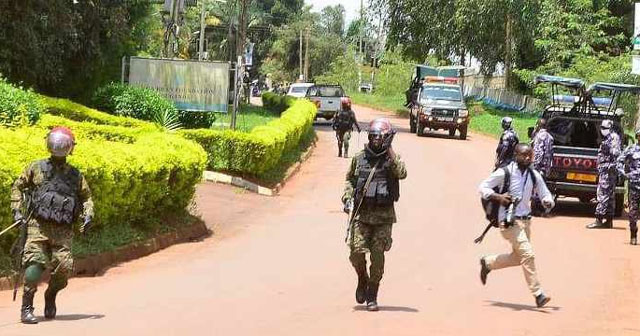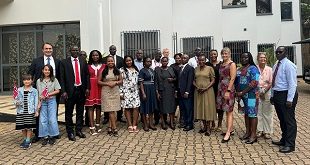
Kampala, Uganda | THE INDEPENDENT | Media owners have been tasked to be at the forefront in the struggle to end attacks on journalists by security agencies.
The Executive Director of Human Rights Network for Journalists-Uganda, Robert Ssempala says that media owners have not made use of their influence and clout to reach areas, persons and offices that journalists cannot get to, yet, they have also not provided enough to guarantee the safety of field personnel.
The concern comes at the backdrop of what appeared to be targeted attacks against journalists by security agencies, as witnessed in the period before and after the general election. Several journalists sustained serious injuries, and a number of them are still undergoing treatment for the same.
“You do not see the main bosses coming to court when journalists sue. You only see the colleagues come to support them in the courts of law. No managers, no owners and no Editors have come up to show the solidarity,” Ssempala told Uganda Radio Network in an interview. According to Ssempala, when journalists are arrested or beaten, media owners under the National Association of Broadcasters (NAB) should come out openly to challenge the status quo.
Ssempala says they have recorded more than 35 clear cases in which security agencies confronted journalists during campaigns, mainly those who were covering National Unity Platform (NUP) candidate Robert Kyagulanyi aka Bobi Wine. In one of them, Moses Waiswa a journalist attached to Busoga One FM was beaten by counter-terrorism police officers while covering Bobi Wine’s campaign trail in Lira.
Waiswa says that despite the injuries he sustained while on duty, his employers did not do much to ensure he gets clear medical treatment. According to Waiswa, his employer gave him a one-off payment of 350,000 Shillings, yet to date, he has spent 3.6 million on treatment. Waiswa said he was directed by doctors to spend 60-days off work for him to be able to recover quickly.
Other incidents that affected the media, according to Ssempala, include the brutality meted against the Ghetto TV media team, which was broadcasting Kyagulanyi’s campaign trail. Three of these were arrested on December 30, as part of the team of 46 supporters who are facing trial in the General Court Martial.
NAB defends its actions
But according to records, the only statement from NAB on the safety of journalists was in October 2020, almost a month before the start of the campaign season. The association instead remained silent at the height of attacks orchestrated during campaigns and in the aftermath.
However, NAB Secretary-General Joseph Beyanga defends the association, arguing that they have done much lobbying for journalists and that NAB should not be judged based on happenings during the election season. For instance, he argues that during the pandemic, before the election, they lobbied to ensure that journalists are classified as essential workers and also lobbied for the release of journalists arrested for defying curfew time.
After the meeting with security chiefs, Beyanga says a sub-committee composed of NAB and security agencies was formed, and through this, NAB continued to raise issues affecting journalists. Unknown are the impacts of these meetings in defence of journalists rights.
However, Ssempala commended the recently founded Uganda Editors Guild, an umbrella body that brings together editors, senior journalists and journalism for the role, it played, in defence of the journalists during the election season. The guild condemned the arrest of journalists and successfully blocked the Media Council’s move to accredit journalists for the coverage of campaigns and the General election.
RELATED STORY
I am shocked Ugandan journalists are angry at being terrorized by security forces alongside other citizens as if they are a special category entitled to an exemption. This is a story of the state use of arbitrary violence against citizens, journalists only being a part! pic.twitter.com/qrPWAwde94
— Andrew M. Mwenda (@AndrewMwenda) February 18, 2021
ANDREW MWENDA: I am shocked Ugandan journalists are angry https://t.co/3tQyZec0Fc
— The Independent (@UGIndependent) February 18, 2021
Dr William Tayeebwa of Makerere University Journalism Department says as the campaign season turned more violent, media owners should have provided protective gear for all field personnel as a measure to mitigate the impact of the attacks.
“It is only journalists from big media houses who had protective gear. Those who were brutalized had no gear.” Given that politics has become like a war zone, Tayeebwa says, the safety of journalists should equally be a top priority for proprietors.
But Dr George Lugalambi, a media researcher says there is nothing else that journalists and media owners could do at the organizational level because the campaign became extremely violent. He says security agencies must protect Ugandans including journalists. “They are the people who were abusing media rights.”
Meanwhile, Derrick Wandera, a reporter with Daily Monitor says that his employers replaced his equipment and mobile phone which were confiscated and damaged by security officers during one of Kyagulanyi’s rallies. But he says that after spending 62 days on the campaign trail, he realised that a lot needs to be done in support of journalists covering hostile situations.
“Employers should make sure that there is job security for reporters especially those working in dangerous environments,” he says. “There should also be medical insurance to even freelance reporters because most of them when they get a challenge that needs medical attention, they are left to suffer and cannot pay their medical bills.”
Rashida Nakaayi, another journalist who sustained injuries when military police battered journalists at the UN Human Rights Office in Kololo says that journalists need assurance from the industry players and leaders for them to be able to perform their duties. “It becomes very hard for some of us to work passionately, knowing that in case of anything, you stand alone,” says Nakaayi.
 The Independent Uganda: You get the Truth we Pay the Price
The Independent Uganda: You get the Truth we Pay the Price


